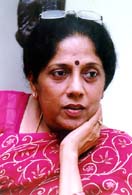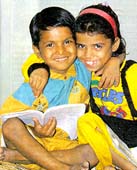The Rediff Interview / Sivasankari
'The message has to be sugar-coated so that it tastes very good'
 Sivasankari is one of Tamil Nadu's most popular figures.
Her fiction and shows on television, which deal with ordinary people,
are a hit. Literary critics are, however, not so enthusiastic about her work.
Nevertheless, her novels on alcoholism and drug addiction received national
attention when television serials based on them were made in Hindi.
Sivasankari is one of Tamil Nadu's most popular figures.
Her fiction and shows on television, which deal with ordinary people,
are a hit. Literary critics are, however, not so enthusiastic about her work.
Nevertheless, her novels on alcoholism and drug addiction received national
attention when television serials based on them were made in Hindi.
The novelist discussed her concerns in an interview with Shobha Warrier
recently. Excerpts from the conversation:
How did your initiation into literature take place?
I never thought I would become a writer. I never thought I
could write. Although my mother tongue is Tamil, I was a student
of Sanskrit. But I have always been sensitive to what happens
around me. As a 25 year old, I happened to witness a ceremony
that was customary in our community. I reacted very badly to it
because I felt it treated women very badly.
When a child is born
in a family, people of our community ask those
women who do not have children, to bathe a grinding stone imagining
it to be a child. All the women in the household stand around and
tell the women to bathe the 'child' properly, otherwise, it will
catch a cold.
I thought it was very insensitive of anyone to ask
a woman to undergo all that. This bothered me a lot. I didn't
know what to do.
How did you react when it actually happened?
Actually, it was me who went through the whole thing. All
this happened thirty years ago. One night, I do not know how many
days after the incident, around eleven, I took a paper and wrote
down whatever that was in my mind. Later on when I read that,
I found it to be a short story. That was the most beautiful accident
in my life.
Later on in life, did you ever think of adopting a child?
 When I was young, I did think of adopting a child. The day
I told my husband about that, he said, great! And then he made me
sit next to him and explained something to me. He said, 'It is
human nature to save everything for your child. If you have ten
rupees, you tend to save nine rupees for your child.' He said,
'Instead of adopting one child and spending for that child alone,
why couldn't we adopt many, many children and give them education?'
I wept when he said this to me.
When I was young, I did think of adopting a child. The day
I told my husband about that, he said, great! And then he made me
sit next to him and explained something to me. He said, 'It is
human nature to save everything for your child. If you have ten
rupees, you tend to save nine rupees for your child.' He said,
'Instead of adopting one child and spending for that child alone,
why couldn't we adopt many, many children and give them education?'
I wept when he said this to me.
I thought he was taking me to
a higher level. The thought that I don't have a child of my own
does not bother me any more. When I was young, I used to feel
that I was not a full women at all. It's great to love the entire
society and embrace the society as your own.
You advise people on many issues. How did you take up this
role?
I have been fortunate enough to have somebody telling me about
life. Every experience teaches you a lesson, good or bad. It always
prepares you to accept life more smoothly. I feel if I care about
society, I should disseminate the view as beautifully as possible.
That's what I have been doing. Writing for me is another extension
of my policy in life which is caring and sharing.
How responsible or committed does has an artist or literary person
have to be towards society? Can s/he cut himself/ herself away
and concentrate on his/her work alone, saying 'I am responsible
only to my conscience'?
An artist or a literary person is not born that way. All are
human beings. I think every human being has a commitment to the
society in which s/he lives because we take so much from
society. Each individual has a commitment, and incidentally that
individual becomes a writer or a doctor or a politician or an
artist. It makes no difference. But since we are in the mass media,
I feel literary people are the torchbearers or opinion-makers
because they have followers. Yes, your responsibility is greater
if you become a public person as we have a moral obligation towards
society.
When did you discover that you have a fan following
and that there are people who idolise you?
Those are all your words! In the first year itself, I
was very, very surprised when even popular personalities called
me to discuss my stories. It's been happening right from the beginning.
It is because I have been dealing with their problems. Most of
my readers identified with my characters. They felt I was
telling them their stories, so they come closer to the writer.
Within a year itself, I could feel I was communicating well
with people. When somebody tells me s/he is my fan, I immediately
correct them, ''No, you are my reader."
Photographs: Sanjay Ghosh
|





 Sivasankari is one of Tamil Nadu's most popular figures.
Her fiction and shows on television, which deal with ordinary people,
are a hit. Literary critics are, however, not so enthusiastic about her work.
Nevertheless, her novels on alcoholism and drug addiction received national
attention when television serials based on them were made in Hindi.
Sivasankari is one of Tamil Nadu's most popular figures.
Her fiction and shows on television, which deal with ordinary people,
are a hit. Literary critics are, however, not so enthusiastic about her work.
Nevertheless, her novels on alcoholism and drug addiction received national
attention when television serials based on them were made in Hindi.
 When I was young, I did think of adopting a child. The day
I told my husband about that, he said, great! And then he made me
sit next to him and explained something to me. He said, 'It is
human nature to save everything for your child. If you have ten
rupees, you tend to save nine rupees for your child.' He said,
'Instead of adopting one child and spending for that child alone,
why couldn't we adopt many, many children and give them education?'
I wept when he said this to me.
When I was young, I did think of adopting a child. The day
I told my husband about that, he said, great! And then he made me
sit next to him and explained something to me. He said, 'It is
human nature to save everything for your child. If you have ten
rupees, you tend to save nine rupees for your child.' He said,
'Instead of adopting one child and spending for that child alone,
why couldn't we adopt many, many children and give them education?'
I wept when he said this to me.